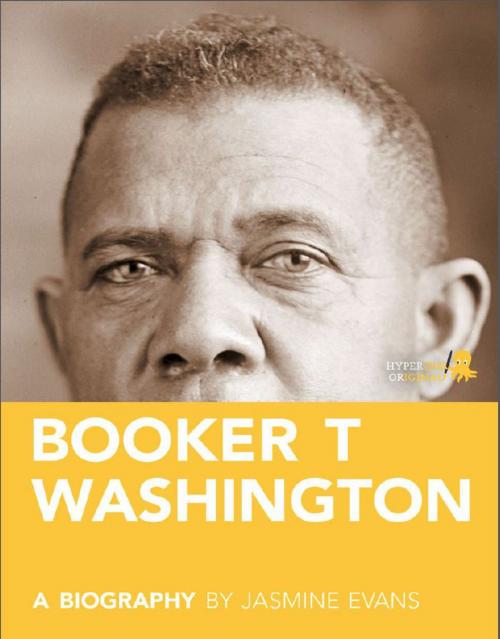| Author: | Jasmine Evans | ISBN: | 9781614646563 |
| Publisher: | Hyperink | Publication: | July 30, 2012 |
| Imprint: | Hyperink | Language: | English |
| Author: | Jasmine Evans |
| ISBN: | 9781614646563 |
| Publisher: | Hyperink |
| Publication: | July 30, 2012 |
| Imprint: | Hyperink |
| Language: | English |
ABOUT THE BOOK
“Few living Americans have made a deeper impression on public opinion, softened or removed so many prejudices, or awakened greater hopefulness in relation to the solution of a problem, encompassed with a thousand difficulties and perplexing the minds of philanthropists and statesmen,” reads the introduction from Dr. J.L.M. Curry in one of Booker T. Washington’s autobiographies, The Story of My Life and Work. When these words were published in 1901, the majority of the United States, particularly the majority of white America, believed them to be true.
Washington was born and lived throughout one of America’s most tumultuous times. He was born in 1856, before the Civil War. He lived through Reconstruction and during the rise of Jim Crow. Significant events were happening throughout the United States during Washington’s life, and he managed to have a significant impact on the nation.
Booker T. Washington lived an extraordinary life. His story is truly a “rags to riches” tale. That much is not in question. However, his stances on racism and the circumstances of blacks in the early 20th century are still argued today.
Acclaimed African-American author and scholar W.E.B. Du Bois dedicated an entire chapter of his book The Souls of Black Folk to Washington. In that chapter, he calls Washington’s rise to power and fame as “the most striking thing in the history of the American Negro since 1876.” What was so striking about it?
Well, Washington was born a slave. In fact, he was among the last of the great black leaders born in slavery. He went from being a slave in Virginia to being free and dirt poor in West Virginia. He had to start working in a salt furnace when he was just nine years old.
Fast forward several years and Washington had founded a college. A couple decades later he was the first African-American invited to the White House. By that point, Washington was the spokesman for blacks across the country, whether they liked it or not. Yes, his life and rise to power could be described as striking.
Yet, in that same chapter of The Souls of Black Folk, Du Bois, who was one of the founders of the National Association for the Advancement of Colored People (NAACP), notes that “Mr. Washington represents in Negro thought the old attitude of adjustment and submission...”
He is referring to Washington’s Atlanta Compromise. In this speech given in Atlanta in 1895, Washington outlined his beliefs and agenda. Whereas many blacks, including other prominent black leaders, wanted an end to disfranchisement and demanded equal rights, Washington urged his people to take it slow.
He believed blacks should “concentrate all their energies on industrial education, and accumulation of wealth, and the conciliation of the South.” The focus on vocational, or industrial, education stemmed from the fact that at the time, most blacks lived in the South, where the economy was overwhelmingly agricultural. Washington hoped that if blacks would focus on useful, agricultural skills, they would prove themselves worthy of more rights.
EXCERPT FROM THE BOOK
The audience for his speech was mixed--whites and blacks from the North and the South. A reporter from the New York World commented that the whites in the crowd were confused by Washington’s presence when he got on the stage.
In his speech, which has since been titled the Atlanta Compromise, he said, “Our greatest danger is that in the great leap from slavery to freedom, we may overlook the fact that the masses of us are to live by the productions of our hands and fail to keep in our mind that we shall prosper as we learn to dignify and glorify common labor.”
...buy the book to continue reading!
ABOUT THE BOOK
“Few living Americans have made a deeper impression on public opinion, softened or removed so many prejudices, or awakened greater hopefulness in relation to the solution of a problem, encompassed with a thousand difficulties and perplexing the minds of philanthropists and statesmen,” reads the introduction from Dr. J.L.M. Curry in one of Booker T. Washington’s autobiographies, The Story of My Life and Work. When these words were published in 1901, the majority of the United States, particularly the majority of white America, believed them to be true.
Washington was born and lived throughout one of America’s most tumultuous times. He was born in 1856, before the Civil War. He lived through Reconstruction and during the rise of Jim Crow. Significant events were happening throughout the United States during Washington’s life, and he managed to have a significant impact on the nation.
Booker T. Washington lived an extraordinary life. His story is truly a “rags to riches” tale. That much is not in question. However, his stances on racism and the circumstances of blacks in the early 20th century are still argued today.
Acclaimed African-American author and scholar W.E.B. Du Bois dedicated an entire chapter of his book The Souls of Black Folk to Washington. In that chapter, he calls Washington’s rise to power and fame as “the most striking thing in the history of the American Negro since 1876.” What was so striking about it?
Well, Washington was born a slave. In fact, he was among the last of the great black leaders born in slavery. He went from being a slave in Virginia to being free and dirt poor in West Virginia. He had to start working in a salt furnace when he was just nine years old.
Fast forward several years and Washington had founded a college. A couple decades later he was the first African-American invited to the White House. By that point, Washington was the spokesman for blacks across the country, whether they liked it or not. Yes, his life and rise to power could be described as striking.
Yet, in that same chapter of The Souls of Black Folk, Du Bois, who was one of the founders of the National Association for the Advancement of Colored People (NAACP), notes that “Mr. Washington represents in Negro thought the old attitude of adjustment and submission...”
He is referring to Washington’s Atlanta Compromise. In this speech given in Atlanta in 1895, Washington outlined his beliefs and agenda. Whereas many blacks, including other prominent black leaders, wanted an end to disfranchisement and demanded equal rights, Washington urged his people to take it slow.
He believed blacks should “concentrate all their energies on industrial education, and accumulation of wealth, and the conciliation of the South.” The focus on vocational, or industrial, education stemmed from the fact that at the time, most blacks lived in the South, where the economy was overwhelmingly agricultural. Washington hoped that if blacks would focus on useful, agricultural skills, they would prove themselves worthy of more rights.
EXCERPT FROM THE BOOK
The audience for his speech was mixed--whites and blacks from the North and the South. A reporter from the New York World commented that the whites in the crowd were confused by Washington’s presence when he got on the stage.
In his speech, which has since been titled the Atlanta Compromise, he said, “Our greatest danger is that in the great leap from slavery to freedom, we may overlook the fact that the masses of us are to live by the productions of our hands and fail to keep in our mind that we shall prosper as we learn to dignify and glorify common labor.”
...buy the book to continue reading!















